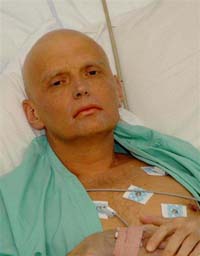Ex-FSB colonel Aleksandr Litvinenko dies in hospital
Ex-FSB Colonel Aleksandr Litvinenko, who was poisoned in London three weeks ago, has died, the hospital treating him said.

Police have launched an investigation into the "unexplained" death of the former Russian spy allegedly poisoned for his fierce criticism of his country's government.
Alexander Litvinenko, 43, died in intensive care at London's University College Hospital despite the medical team doing "everything possible" to save his life. There had been a major deterioration in his condition overnight on Wednesday, when he suffered a heart attack and failed to recover.
Scotland Yard's counter-terrorism command is leading the investigation into the cause of Mr Litvinenko's illness and subsequent death, but it has not launched a murder inquiry, Guardian reports.
Litvinenko was a colonel in the Federal Security Service, FSB, the domestic successor to the KGB, who became highly critical of some of his superiors. He is well known for accusing FSB agents of involvement in apartment building bombings in 1999 that killed more than 300 people. Russian officials blamed the attacks on separatists from Chechnya and launched a new military offensive in the republic.
Litvinenko fled Russia for Britain in 2000 and was granted political asylum and then citizenship. He has been living in London with his wife and son.
Recently, Litvinenko began looking into the unsolved killing of investigative journalist Anna Politkovskaya, who was shot last month in Moscow . She too was a prominent critic of Putin.
Litvinenko was absolutely adamant that the poisoning was done on behalf of Putin, said Goldfarb. He said Litvinenko had told him soon after he began vomiting Nov. 1 that he been poisoned but it took nearly two weeks to confirm it, Washington Post reports.
As Pravda.ru earlier reported Russia's foreign intelligence service denied involvement in the poisoning of Alexander Litvinenko .
"Litvinenko is not the kind of person for whose sake we would spoil bilateral relations," Interfax quoted Sergei Ivanov , a spokesman for the Foreign Intelligence Service, as saying. "It is absolutely not in our interests to be engaged in such activity."
The hospital said that while preliminary tests suggested Litvinenko had not been poisoned by thallium salt the most common form of the toxin radioactive thallium remained a possibility.
Radioactive thallium is commonly used in hospitals, injected into the bloodstream to act as a tracer during heart scans, reports AP.
Source: agencies
Prepared by Alexander Timoshik
Pravda.ru
Subscribe to Pravda.Ru Telegram channel, Facebook, RSS!




